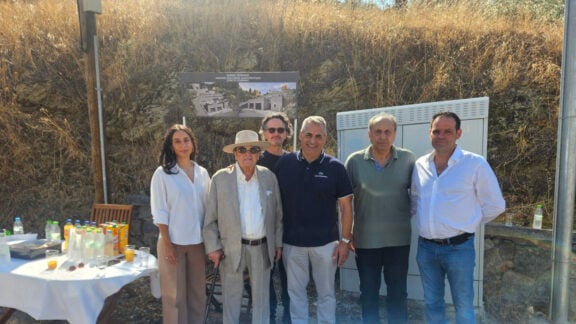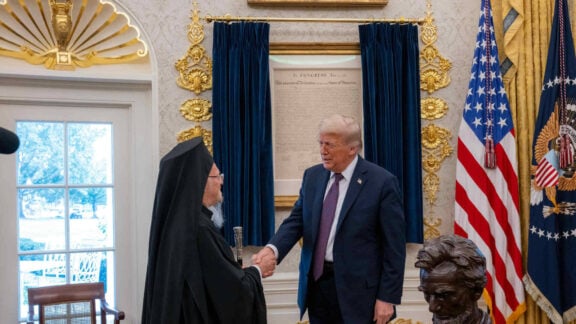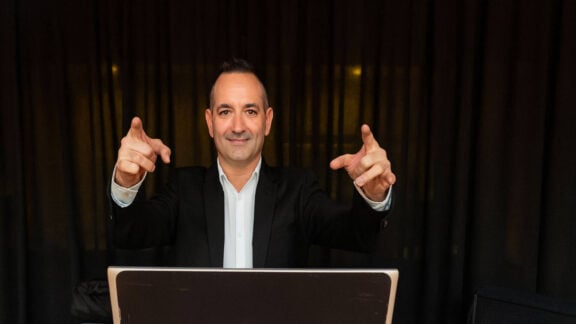The famous English philosopher, Bertrand Russell, gave a talk in 1927 entitled ‘Why I Am Not a Christian’. Following Russell’s lead, I will outline here the reasons why I have chosen to finally sever my ties with the Orthodox Church, after many years of participation in the church and reflection on its history and teachings. In fact, the position I have come to is even more radical than that, as I will indicate towards the end, for I now regard commitment to any institutionalised form of religion, Christian or otherwise, as incompatible with the pursuit of truth and wisdom.
Like the majority of this newspaper’s readers, I had a fairly conventional Orthodox upbringing, including the mandatory baptism, observance of the major feasts and customs of the Christian calendar, such as the fast leading up to Easter, the occasional communion and confession, and so on. Most members of our community would be content to leave matters there, regarding the Orthodox Church primarily as a custodian of ethnicity, tradition and morality. But no thinking person could be satisfied with that, and I soon began to delve deeper, in the hope of discovering if there was any truth to the grand claims made by the church. So I embarked upon a course of study in philosophy and theology, including a four-year stint at the Archdiocese’s Theological College in Sydney. Archbishop Stylianos shocked us in our very first class when he warned that the study of theology will either turn us to God or turn us into atheists. He was not entirely mistaken.
Strangely, however, his words proved to be a self-fulfilling prophecy, as it was the very attitudes and teachings imbibed to us that led myself and some of my fellow students (and even teachers) to suspect that something was deeply amiss in Orthodoxy. By the time I completed my theological studies I could no longer fail to acknowledge the serious problems crippling the Orthodox faith in the modern world, though I often wavered as to whether and how these problems could be resolved. In a talk I gave last year as part of the Greek Community’s seminar series, I discussed a number of challenges faced by the Orthodox Church in the modern era, and I will now summarise a few of these.
There are, firstly, challenges of a general sort, including the prevalence of exclusivism amongst Orthodox leaders, where this involves an attitude of triumphalism and a sense of superiority towards other religious groups – just consider the official policy of the Orthodox Church on mixed marriages and intercommunion or sacramental fellowship. There is also a strong strain of anti-Westernism in much recent Orthodox theology – consider, for example, Christos Yannaras’ ‘contamination model’, according to which nearly everything that has come from the West (beginning with the translation into Greek of Thomas Aquinas’ Latin writings in the 14th century) has contaminated the purity and the authenticity of Orthodox tradition. Further, there is evident a psychopathology of defensiveness and victimisation (related, no doubt, to the church’s struggle for survival under oppressive Ottoman and communist regimes), allied with a propensity towards traditionalism, where this often takes the form of a naïve romanticism about the Byzantine past.
Secondly, there are challenges relating to the ways in which the church is structured. Samuel Huntington, in The Clash of Civilizations, infamously stated that Europe ends where Western Christianity ends and Islam and Orthodoxy begin. Like much of modern-day Islam, the Orthodox Church has yet to genuinely shake off its autocratic medieval inheritance and to promote democratic principles, both within the church and outside it. Admittedly, there are many Orthodox leaders who champion freedom, justice, equality and pluralism in principle, but in practice they often remain wary of the open competitiveness and embrace of difference that democracy promotes – consider the reluctance of the hierarchs and clergy of Greece in supporting church-state separation. Just as importantly, the Orthodox Church refuses to democratise itself by, for example, allowing the whole church to elect its bishops, and adopting a more inclusive approach towards the laity, especially women (who continue to be barred from ordination and even, in most cases, from the sanctuary).
Thirdly, there is the endemic ritualism of Orthodoxy. Without wishing to deny the importance of ritual, the tendency in Orthodoxy is to over-indulge in liturgical practices at the expense of the internal life of the individual (e.g., existential and moral difficulties) and the social life of the broader community (e.g., the plight of Indigenous Australians).
I am reminded of the great medieval conflict between Russian and Greek Orthodox over whether the sign of the cross should be done with two or with three fingers. Unfortunately things have not greatly improved since then. The language problem persists, with services conducted in an archaic language understood by virtually no-one. The liturgy has become the preserve of the clergy, with minimal or no active participation from the laity. And, further, unnecessary prominence is often accorded to expensive vestments and utensils, and ornate (even pompous) architecture and paintings, thus creating a sense of theatricality and an aura of mystique, to the exclusion of an approach that is more politically engaged or one that promotes rational understanding. What are you meant to take home with you after attending a liturgy of this sort? Where is the room in these rituals for brokenness, doubt and questioning?
Fourthly, there is the unfortunate problem of ethnocentricism – the unholy alliance between nationality (e.g., ‘Greekness’) and Orthodoxy, evident in Greece as well as here. To be fair, the main priority of the Orthodox Church in Australia has been to shape and give identity to its expatriate communities, and it has done much valuable work in the areas of social welfare (e.g., care for the elderly), education, and youth activities. But all this is generally confined to a particular ethnic group, and does not extend to the wider community. The result has been an introverted and insular church with little or no missionary endeavour, the formation of multiple jurisdictions divided along ethnic lines (e.g., the Greek Orthodox Church of Australia, the Serbian Orthodox Church of Australia, etc.), and even the refusal or reluctance to use English.
These and many other problems in the Orthodox Church have created what might be called ‘the lost generation’. A large proportion (perhaps the majority) of second generation Greek Australians have, for all intents and purposes, lost the faith of their parents and ancestors. Their response to the refusal or inability of the church to engage in serious self-criticism and internal reform has been to leave, drift away, be indifferent, or treat the church as a purely cultural institution. A minority, usually those with a developed religious sensibility, look elsewhere, either to other churches or to non-religious groups, perhaps preferring to identify themselves as ‘spiritual but not religious’.
There was a time when I hoped for church renewal, when I held out for the possibility, however remote, of another Reformation. But I quickly came to see that as an illusion. Centuries-old institutions like the Orthodox Church are too heavily invested in power and prestige to allow for genuine challenges to their beliefs and practices. There have been calls (mainly from liberal Catholics and Protestants) for a new kind of Christianity, a new way of being an ‘ecclesia’: a community centred on the values of humility, creativity and openness, with a preparedness (as a church) to repent and seek forgiveness. That would certainly be an improvement on the Orthodox model, but it still doesn’t go far enough.
The lover of wisdom, the ‘philos-sophos’, is one who never ceases searching and questioning, even if they become – like Socrates, the ‘gadfly of Athens’ – irritating and infuriating, and are ostracised or condemned by their society. The life of the mind as practiced by Socrates is not well suited to church membership, or any religious affiliation for that matter. A church or religion, even the most alternative and liberal, will sooner or later put a stop to questions and demand answers, since it is the answers that define the boundary and identity of the group. For the philosopher, however, answers are always fluid and provisional; the only constants are the questions, and therefore the path to wisdom must be a solitary one.
Few people understood this as well as the great but under-rated Greek poet and novelist, Aris Alexandrou (1922-78), who spent much of his life in jail or in exile for his refusal to submit to political authority. Soon after his acclaimed novel Το κιβώτιο was published in 1974, he was asked in an interview, “which political party do you belong to?”, to which he replied: “I don’t belong to any party, nor to any political group. I am not a member of any church. I am not a follower of any religion. As I’ve said before, ‘Δεσμώτης τῇδε ἳσταμαι τοῖς ἔνδον ρήμασι πειθόμενος’.” This ancient Greek phrase – which can be translated as “Here I stand committed, abiding by the voice within” – has something of the spirit of Socrates about it. Like Socrates, we need to listen to our inner daimon, forging our own paths and thinking for ourselves rather than letting others think for us.
* Nick Trakakis is a philosopher at the Australian Catholic University, where he is assistant director of the Centre for Philosophy and Phenomenology of Religion. He has taught at Monash University and Deakin University, and previously was a postdoctoral research fellow at the Centre for Philosophy of Religion at the University of Notre Dame.





